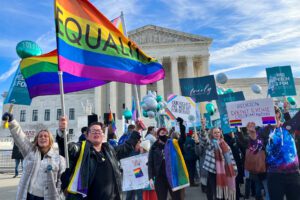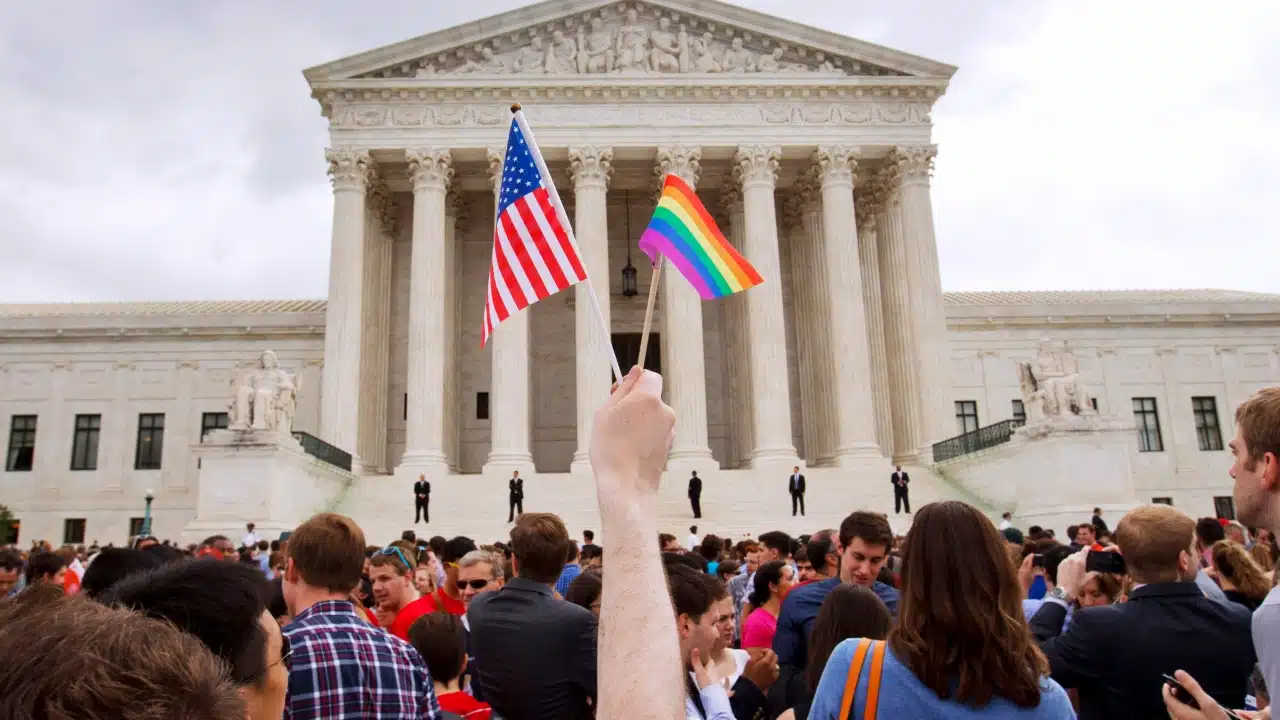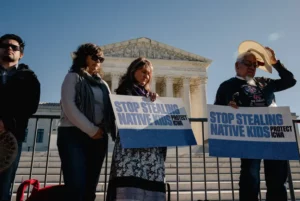
The case of a Christian website designer from Colorado who opposes same-sex marriage reached the Supreme Court on December 5. Because the Court said it would only address freedom of speech issues, the hearing pitted concerns over discrimination against freedom of artistic expression.1
Why Did This Case Reach the Supreme Court?
Lorie Smith wants to expand her web design business (303 Creative LLC) to include wedding websites, which she says she has dreamed of doing since childhood.2 Smith has religious objections to same-sex marriage and wants to post that message on her website, but doing that would likely violate the Colorado Anti-Discrimination Act. That law prohibits businesses open to the public from discriminating against customers on the basis of legally protected characteristics (in this case, sexual orientation) or communicating that such groups of people are unwelcome.3
Smith says that she has LGBTQ-identifying clients and would “happily” design graphics for their other endeavors, but creating their custom-made wedding websites would imply her approval of their marriage.4 Smith considers her artwork a form of speech, explaining, “It matters not to me how an individual identifies. What’s important to me is what message is I’m being asked to create and design for. And those messages must be consistent with my convictions.”5
Colorado argues that its law looks only at sales, not speech, to prevent marketplace discrimination, consistent with a longstanding legal tradition of ensuring public accommodations for all groups of people.6 Colorado argues that many businesses could claim their work is creative, and thus “speech,” thereby excusing discriminatory treatment.7 According to the state’s lawyer, “Your product can be a book or a painting, but once you make your product you can’t discriminate against certain customers based on who they are.”8
Lower courts have ruled for Colorado, citing “dignity interests” of members of marginalized groups.9 Many observers point to similarities between Smith’s case and the 2018 case of a baker (represented by Smith’s same lawyers) who claimed free speech and religious exercise should allow him to avoid serving same-sex couples.10 Then, the Supreme Court did not address freedom of speech and reaffirmed a precedent that prevents business owners from denying services due to religious objections.11 In 2021, the Court chose not to hear a similar objection from a florist who declined service for a same-sex wedding.12
What Arguments Shaped the Supreme Court Hearing?
The lengthy hearing considered whether Colorado’s law compels an artist to speak or stay silent, in violation of Free Speech rights.13 To address that question, the justices posited numerous hypothetical situations—a common tactic used to make a point or consider implications the specific case might have for other laws.14 Justice Amy Coney Barrett asked if Smith would design a website for a heterosexual couple marrying after divorcing previous spouses.15 In Justice Barrett’s words, “It’s about the message and not about the sexuality of the couple that asked her to express it.”16
Justice Ketanji Brown Jackson offered a hypothetical asking if a mall photographer who wanted to take “nostalgia photographs” of children with Santa evoking the 1950s could enact a policy “that only white children can be photographed with Santa.”17 Smith’s lawyer indicated that it would depend if the objection related to the speech or to the person’s demographics, noting, “When there is an overlap between message and status, message does win.”18 The lawyer also said, “There are difficult lines to draw, and that may be an edge case.”19 When Justice Samuel Alito expanded on the hypothetical, asking if a Black Santa would have to take a photo with a child in a Ku Klux Klan outfit, Colorado’s lawyer said no, since the clothing is not a protected characteristic.20 When Justice Elena Kagan pointed out that in this case, the child’s race would not matter, Justice Alito joked about Black children in KKK outfits (this and other comments have drawn public backlash).21
Justice Sonia Sotomayor argued that the message was the couple’s “story,” but Justice Neil Gorsuch likened it to a freelance writer who declines to work for clients of a different faith.22 Justice Kagan noted that denying a same-sex couple a standard website would be different than refusing to create one saying “God blesses this union,” and Colorado’s lawyer agreed that such “direct speech” is “trickier.”23
The hearing also considered how sweeping an exemption would be. Justice Clarence Thomas observed, “This is not a hotel. This is not a restaurant. This is not a riverboat or a train.”24 Considering whether caterers or chair vendors could claim a speech exemption, Smith’s lawyer argued that “art is different.”25 Justice Sotomayor wondered who else could be denied service, asking, “How about people who don’t believe in interracial marriage? Or about people who don’t believe that disabled people should get married? Where’s the line?”26 Smith’s lawyer called the scenario “highly unlikely” and said, “The line is that no one on any side of any debate has to be compelled to express a message that violates their core convictions.”27
Regarding broader implications, Justice Sotomayor said, “This would be the first time in the Court’s history that it would say that a commercial business, open to the public, serving the public, that it could refuse to serve a customer based on race, sex, religion, or sexual orientation.”28 The lawyer for President Joe Biden’s administration warned that a ruling for Smith could allow a private school to exclude children on the basis of race by saying their teaching message changes when delivered “to students of a different race.”29 By contrast, Chief Justice John Roberts noted that the Supreme Court has never approved efforts to compel speech that is contrary to the speaker’s belief.30
What May Happen Next?
Many Supreme Court observers anticipate a ruling in favor of Smith.31 According to Notre Dame Law School professor Rick Garnett, justices spent the hearing asking about lines and limits when public accommodations laws tangle with First Amendment rights.32 The Court will provide its answer by July 2023.33
Discussion Questions
- During the hearing, Justice Brett Kavanaugh said, “The case comes down to a fairly narrow question of, how do you characterize website designers? Are they more like the restaurants and the jewelers and the tailors, or are they more like the publishing houses and the other free speech analogues that are raised on the other side?”34
- Do you think a restaurant, jeweler, tailor, florist, or caterer’s work is creative enough to represent their freedom of expression? Why or why not?
- Do you think a restaurant, jeweler, tailor, florist, or caterer should be able to deny service on the basis of sexual orientation because of their religious beliefs? Why or why not?
- Do you think a website designer’s work is so creative that it represents their free speech? Why or why not?
- Imagine a custom-made Smith wedding website that includes photos, stories, and details about wedding event times and places. Which of this website content, if any, is Smith’s speech and which, if any, is her clients’ speech? Why?
- Do you think a freelance writer should be able to deny service to someone on the basis of their political viewpoint? Why? Do you think that writer can deny service to a group of people on the basis of race or sexual orientation? Why or why not?
- People supporting Smith worry that ruling against her would mean that other Christian and religious business owners will not be able to open businesses without having to violate their speech and/or religious beliefs by serving clients whose viewpoints or identities they oppose. People opposing Smith worry that ruling for her would allow a wide variety of businesses to use speech or religious grounds for discriminating against minority groups (akin to the Jim Crow era). Which set of consequences are you more concerned about? Why?
- If you had final legal authority to decide this case, would you allow Smith to create wedding websites only for heterosexual couples? Why or why not?
- What principles would you use to determine which businesses could deny service to groups of people and which, if any, could not claim an exemption to public accommodation laws based on free speech?
Additional Resources
- LISTEN to the Supreme Court oral argument of 303 Creative LLC v. Elenis and download the audio file and transcript.
- WATCH Smith and her lawyer comment on the case.
- WATCH a civil rights attorney and a progressive judicial activist comment on the hearing and its implications.
- REVIEW a chart of every state’s public accommodation laws from the National Conference of State Legislatures (NCSL).
- DISCUSS other controversial issues in the current Court term. See this blog’s posts on cases addressing the Voting Rights Act, affirmative action, and the Indian Child Welfare Act.
- READ previous posts from this blog with discussion questions on the Respect for Marriage Act and a proposed 2019 Labor Department religious exemption rule for more on LGBTQ+ rights and religious exemptions.
As always, we encourage you to join the discussion surrounding minority rights and the first amendment with your comments or questions below.
Sources
Featured Image Credit: Caitlyn Kim, Colorado Public Radio (CPR) News
[1] Roll Call: https://rollcall.com/2022/12/05/supreme-court-hears-arguments-in-same-sex-wedding-website-clash/
[2] Associated Press: https://apnews.com/article/us-supreme-court-religion-colorado-discrimination-360d60888809823779d033acce40c9bf
[3] Oyez: https://www.oyez.org/cases/2022/21-476
[4] Colorado Public Radio (CPR) News: https://www.cpr.org/2022/12/01/this-colorado-web-designer-doesnt-want-to-make-wedding-sites-for-same-sex-couples-the-u-s-supreme-court-will-decide-whether-thats-legal/
SCOTUSblog: https://www.scotusblog.com/2022/12/colorado-web-designers-first-amendment-supreme-court-lgbtq-anti-discrimination-laws/
[5] Colorado Public Radio (CPR) News: https://www.cpr.org/2022/12/01/this-colorado-web-designer-doesnt-want-to-make-wedding-sites-for-same-sex-couples-the-u-s-supreme-court-will-decide-whether-thats-legal/
[6] Cornell Law School Legal Information Institute: https://www.law.cornell.edu/uscode/text/42/2000a
SCOTUSblog: https://www.scotusblog.com/2022/12/colorado-web-designers-first-amendment-supreme-court-lgbtq-anti-discrimination-laws/
U.S. Department of Justice: https://www.justice.gov/crt/title-ii-civil-rights-act-public-accommodations
[7] Colorado Public Radio (CPR) News: https://www.cpr.org/2022/12/01/this-colorado-web-designer-doesnt-want-to-make-wedding-sites-for-same-sex-couples-the-u-s-supreme-court-will-decide-whether-thats-legal/
[8] Ibid.
[9] Associated Press: https://apnews.com/article/us-supreme-court-lifestyle-religion-couples-a5edfc7184a85dde5775994b8bd86a7c
[10] Bloomberg Law: https://news.bloomberglaw.com/us-law-week/wedding-cake-lawyer-back-to-supreme-court-in-new-same-sex-case
[11] Oyez: https://www.oyez.org/cases/2017/16-111
Slate: https://slate.com/news-and-politics/2022/03/supreme-court-303-creative-coordinated-anti-lgbt-legal-strategy.html
[12] USA Today: https://www.usatoday.com/story/news/politics/2021/07/02/same-sex-marriage-supreme-court-religious-fight-weddings/2836274001/
[13] Politico: https://www.politico.com/news/2022/12/05/lqbtq-supreme-court-arguments-00072468
Supreme Court of the United States: https://www.supremecourt.gov/oral_arguments/calendars/MonthlyArgumentCalDecember2022.html
[14] Politico: https://www.politico.com/news/2022/12/05/lqbtq-supreme-court-arguments-00072468
USA Today: https://www.usatoday.com/story/news/politics/2013/10/23/supreme-court-hypothetical-questions/3108881/
[15] CBS News: https://www.cbsnews.com/live-updates/supreme-court-same-sex-marriage-lgbtq-rights-303-creative-v-elenis/
[16] MSNBC: https://www.msnbc.com/opinion/msnbc-opinion/lgbtq-rights-case-gets-conservative-supreme-court-treatment-rcna59800
[17] NPR: https://www.npr.org/2022/12/05/1140824371/supreme-court-gay-marriage-colorado
[18] Colorado Public Radio (CPR) News: https://www.cpr.org/2022/12/05/supreme-court-seems-poised-to-side-with-colorado-web-designer-in-303-creative-case/
[19] MSNBC: https://www.msnbc.com/opinion/msnbc-opinion/lgbtq-rights-case-gets-conservative-supreme-court-treatment-rcna59800
[20] Associated Press: https://apnews.com/article/us-supreme-court-entertainment-religion-race-and-ethnicity-discrimination-9f2a76e9c72b6e0dc2a513a968328799
[21] Associated Press: https://apnews.com/article/us-supreme-court-entertainment-religion-race-and-ethnicity-discrimination-9f2a76e9c72b6e0dc2a513a968328799
CNN: https://www.cnn.com/2022/12/05/politics/black-white-santa-alito-jackson-kagan-ashley-madison/index.html
Deseret News: https://www.deseret.com/2022/12/6/23496821/samuel-alito-comments-black-santa-kkk
MSNBC: https://www.msnbc.com/11th-hour/watch/critical-week-for-scotus-156326469557
Reuters: https://www.reuters.com/legal/government/us-supreme-court-makes-jokes-ignores-facts-lgbtq-rights-hang-balance-2022-12-14/
The Week: https://theweek.com/laws/1019026/supreme-court-303-creative-v-elenis-whats-at-stake
[22] CBS News: https://www.cbsnews.com/live-updates/supreme-court-same-sex-marriage-lgbtq-rights-303-creative-v-elenis/
[23] Colorado Public Radio (CPR) News: https://www.cpr.org/2022/12/05/supreme-court-seems-poised-to-side-with-colorado-web-designer-in-303-creative-case/
[24] CBS News: https://www.cbsnews.com/live-updates/supreme-court-same-sex-marriage-lgbtq-rights-303-creative-v-elenis/
[25] SCOTUSblog: https://www.scotusblog.com/2022/12/conservative-justices-seem-poised-to-side-with-web-designer-who-opposes-same-sex-marriage/
[26] Associated Press: https://apnews.com/article/us-supreme-court-entertainment-religion-race-and-ethnicity-discrimination-9f2a76e9c72b6e0dc2a513a968328799
[27] The Center Square: https://www.thecentersquare.com/national/u-s-supreme-court-hears-colorado-case-over-free-speech-lgbt-rights/article_06c66b20-74df-11ed-9cde-dfade9e2a638.html
[28] Colorado Public Radio (CPR) News: https://www.cpr.org/2022/12/05/supreme-court-seems-poised-to-side-with-colorado-web-designer-in-303-creative-case/
[29] SCOTUSblog: https://www.scotusblog.com/2022/12/conservative-justices-seem-poised-to-side-with-web-designer-who-opposes-same-sex-marriage/
[30] Ibid.
[31] CNN: https://www.cnn.com/2022/12/05/politics/303-creative-supreme-court-conservatives/index.html
Deseret News: https://www.deseret.com/faith/2022/12/13/23500136/how-will-supreme-court-rule-gay-rights
Newsweek: https://www.newsweek.com/no-chance-amy-coney-barrett-will-recuse-herself-lgbt-rights-case-1761395
Reuters: https://www.reuters.com/legal/government/us-supreme-court-makes-jokes-ignores-facts-lgbtq-rights-hang-balance-2022-12-14/
Washington Examiner: https://www.washingtonexaminer.com/restoring-america/fairness-justice/justices-dive-into-wild-hypotheticals-in-free-speech-case
[32] Deseret News: https://www.deseret.com/faith/2022/12/13/23500136/how-will-supreme-court-rule-gay-rights
[33] CBS News: https://www.cbsnews.com/live-updates/supreme-court-same-sex-marriage-lgbtq-rights-303-creative-v-elenis/
SCOTUSblog: https://www.scotusblog.com/2022/12/conservative-justices-seem-poised-to-side-with-web-designer-who-opposes-same-sex-marriage/
[34] CBS News: https://www.cbsnews.com/live-updates/supreme-court-same-sex-marriage-lgbtq-rights-303-creative-v-elenis/

 What began as a child custody lawsuit evolved into a lengthy hearing of four consolidated cases before the Supreme Court on November 9, 2022.1 The law in question is the Indian Child Welfare Act (ICWA) and the Court’s eventual ruling on it could impact laws about race, states’ rights, and the sovereignty of Native American tribes.2
What began as a child custody lawsuit evolved into a lengthy hearing of four consolidated cases before the Supreme Court on November 9, 2022.1 The law in question is the Indian Child Welfare Act (ICWA) and the Court’s eventual ruling on it could impact laws about race, states’ rights, and the sovereignty of Native American tribes.2






